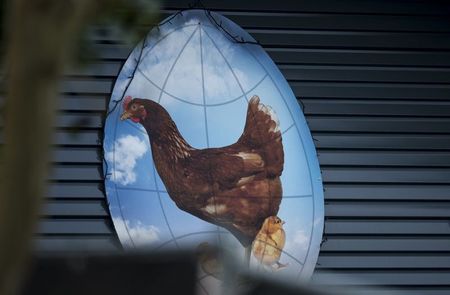By Anthony Deutsch
AMSTERDAM (Reuters) - A highly contagious form of bird flu has not spread to two farms close to an outbreak site in central Netherlands, Dutch authorities said on Monday, as health safety officials continued to cull 150,000 birds at the infected egg producing farm.
The discovery at the weekend near the village of Hekendorp, in the central Netherlands, triggered a three-day ban on shipments of all poultry products out of the country - the world's largest egg exporter - and a 10-km exclusion radius was set up around the infected farm, to be sealed for 30 days.
"No new infections were discovered at two farms near this one and the European Commission has expressed satisfaction with our response," Economic Affairs Ministry spokesman Jan van Diepen said on Monday.
The Netherlands, a tiny trading nation with a population of less than 17 million, is the world's second largest exporter of agricultural products after the United States, sending 79 billion euros (63.29 billion pounds) of agricultural goods abroad in 2013. It is also the largest exporter of poultry meat in the European Union, according to figures from the International Poultry Council.
A 72-hour transportation ban was in place at nearly 700 Dutch poultry farms across the country and the European Union said it was considering urgent interim measures to prevent a wider European outbreak.
Between them, Dutch poultry farms sell more than 6 billion eggs abroad every year. Germany is the biggest recipient, receiving 75 percent of all Dutch exports.
The Dutch outbreak was of the same H5N8 variety found at a German farm, but officials said they had not yet traced the origin of the infection and could not say if they were related.
Britain on Monday also reported a case of the disease on a duck-breeding farm in northern England, which could be linked.
The Dutch hens began to show symptoms of H5N8 on Friday and blood tests confirmed the infection on Saturday.
Unlike H5N1, which has killed dozens of people in Asia in recent years, the H5N8 variety found in the Netherlands has not been detected in humans.
An outbreak in South Korea resulted in the slaughter of millions of farm birds. Cases of H5N8 have also been reported in China and Japan, although the strain was first reported in Europe, on a German farm, in early November.
Between 2003 and 2006, around 30 million hens were culled after an outbreak of bird flu in the Netherlands.
The H5N8 strain of bird flu was reported in Germany on Nov. 4 on a farm in the northeastern state of Mecklenburg-Vorpommern.
All 300 petting zoos in the Netherlands were also closed until Wednesday.

"People can spread this flu as well as animals," said the Association of Petting Zoos. "People can't infect other people, but they can infect chickens."
(Additional reporting by Thomas Escritt; Editing by Sophie Walker)
